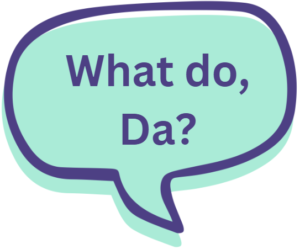When my son was learning to talk, he loved following his dad around the house and asking: “What do, Da?”. It was exceptionally cute the first five or ten times, and my husband would patiently explain what he was doing … but it got tedious pretty fast.
“What do, Da?”
“I’m building a deck.”
“Ah … what do, Da?”
“I’m building a deck.”
“Ah … what do, Da?”
“I’m STILL building a deck.”
What is it about questions? Why do they stop us in our tracks?
Well, actually, questions are the answer to a whole range of conflict and negotiation situations. You can use questions:
- TO LAG
If you are in any form of difficult conversation and your emotions are getting the better of you, asking a question will pause the pressure on you.
How?
The lag gives you time to regroup, get your emotions under control and you may well learn helpful information that you might otherwise have missed. - TO SNAG
To negotiate and manage conflict, you need to understand the other party. Obviously, questions help with this.
How?
Use active listening to snag important information. When the other party is answering your questions, listen carefully and don’t start thinking about what you will say next. - TO BAG
If you think the other party is lying to you, using questions rather than statements saves any potential humiliation for you.
How?
If they are lying, your prolonged, polite questioning should bag them in the lie. If they aren’t lying, you won’t embarrass yourself by making a false accusation. - TO ZIGZAG
Sometimes, asking what feels like a dumb question opens up a new direction for the conversation or negotiation.
How?
In any high-stakes discussion, people focus on their own positions. A zigzag or change of direction, like a “dumb” question, can surprise people and make them consider things from a different perspective. - TO BRAG
Asking questions isn’t just about getting answers; you can also use questions as a strategy to share important information.
How?
Disguise a humble brag as a question, e.g. “Would you like to hear about the work I am doing with XX client?”
Here are some ways you can learn more about using questions to master negotiation and positive conflict challenges:
- I can speak at your conferences and events.
- I can train your teams in negotiation and conflict management.
- I can facilitate collaborative agreements with your leadership teams.
- I can provide coaching to help you improve your negotiation and conflict skills.
